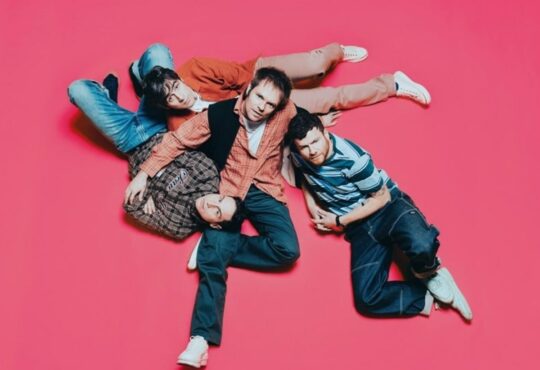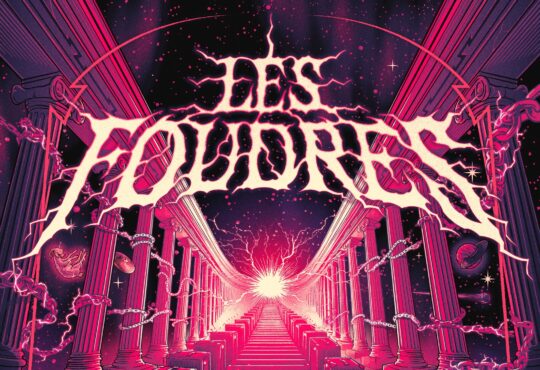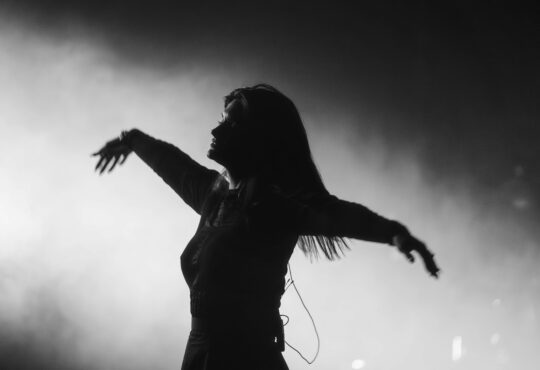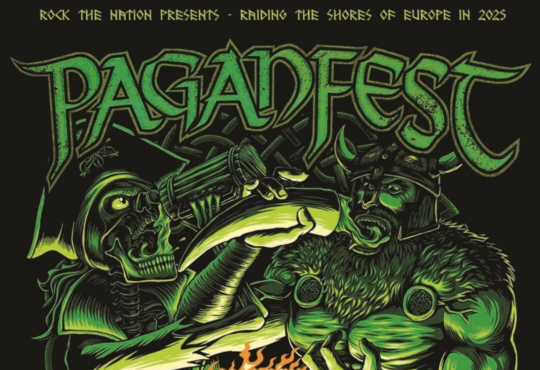Before a very intense headline show at a wide yet crowded Elysée Montmartre, we met up with vocalist, songwriter and musician Rou Reynolds to talk about his band Enter Shikari’s fifth record “The Spark”, and the changes he’s been through that influenced its composition.
Enter Shikari has always been a band that’s done things their own way. Your new record “The Spark” is certainly the most polarizing album you’ve ever put out: while it remains loyal to your punk and electronic roots, it also includes new influences such as new wave or pop music, which could confuse some people. Also, lyrically, even though the political message that you’re famous for is still present, it’s less explicit on this album. Could you explain this?
Rou Reynolds (vocals): Yes. I wanted to write an album that would try to offer a different perspective. Something hopefully a bit deeper. We definitely need overly political music, we need people saying: “Fuck Donald Trump!”. But I think that we’ve sort of done that, so I wanted to offer something different. In this album, what I’m trying to do is marry the personal and the political together. My aim was to write an album that is unafraid to show human vulnerability because that’s our natural state. A human has to be fed and cared for for quite a few years before they can take care of themselves. The reason why I think we have people like Donald Trump in the world is because he’s been brought up to think he can’t be vulnerable. He had to be “a man”. He went to military school, he’s got pride and anger and ignored so many other emotions, especially being a male influenced him. So as you said, what we’ve tried to do was political, but not as explicit as before indeed. The goal was to make people realize it’s okay to be vulnerable. And then hopefully, if a movement builds around that mindset, we’ll get less people as nasty as Donald Trump. (laughs) That’s the grand plan. We’re just doing our little part.
You’ve point out the meaning of vulnerability in daily life but also in the music you want to make. In our culture, there’s still so much inherent shame when we talk about our mental health, and we still don’t talk about it in the same way we do our physical health. How has experiencing notoriety/life in a band impacted your mental health?
Rou: It has impacted it dramatically. In some ways, it’s been very helpful, because I was a much shyer, introverted person before, and being in a band pushed me to become more outgoing I suppose. But also, I’ve learned a lot about myself through exhaustion from touring so much. Loads of things happened in 2015-2016 which consequently influenced the lyrics to “The Spark”. It made me learn a lot about myself that maybe I would have never been pushed to learn if I wasn’t in a band. Through exhaustion comes sleep deprivation, then anxiety gets higher, then depression starts creeping in as well or OCD, basically piles on top of each other. I think if I was living a more relaxed lifestyle, I wouldn’t have to deal with that, but in the same way I feel happy that I had to deal with it because somehow I feel like a much stronger person now. It’s a bit of a double-edged sword being in this band.
Then, which song that you wrote on this album would you consider to be your favourite and why?
Rou: I don’t know, it totally changes all the time. (laughs) It’s probably “Undercover Agents” at the moment. Everytime we play it live, it just fills me with happiness. The very last chorus where everyone does their guitar solo, I just run around dancing on stage. I really enjoy playing that song.
Let’s talk about about the ups and downs of social media now. Beyond the job of just being an artist, there must be some pressure to never be left alone even once you left the stage, as comments and messages keep on showing up on your phone screen. How has this pressure impacted the way you use social media as an artist?
Rou: I think that sadly, being an artist nowadays is at least 50% media management. It’s all about giving content, updating things and connecting. In a way, it’s good because you get to connect with more people, even though it’s a bit superficial because it’s only through a screen. But I think it’s good to break down the pedestal and be contactable by everyone. It gets a little frustrating when everything seems to be focused on how someone looks or how cool is their Instagram instead of what they are creating. It’s just the time we live in I guess. The track that I’ve mentionned before, “Undercover Agents”, is basically about social media: hiding bits of yourself, the pressures of having to keep giving bits of who you are online and try to keep up with everyone. There’s studies done about how social media really increases depression because suddenly you’re seeing the best bits of everyone’s life.
…Then you start comparing yourself to everyone.
Rou: Exactly. It gets very difficult. There are a lot of negative aspects to it, but at the same time it’s hard to imagine it being any different. It’s now ingrained in all of us.
Your band’s also famous for powerful and passionate live performances. We were reading an interview from a London-based band last time who said that for them, performance had to be confrontational. Would you agree with this statement?
Rou: It’s really interesting. 10 years ago, I would have instinctively agreed with that. I think that’s how we lived that was how we performed. We were always to push things forward. Especially when we started out, we were used to being hated. When it began 13 or 14 years ago, gender purists were much more of a thing: there was people who only listened to metal or dance music, then the rest was shit. Then there was us, and everyone went like: “What the fuck is this?”. For us, gigs were always confrontational. The thing about being in a punk band is that you’re constantly pushing things forward, challenging people and encouraging them to use their minds. So much mainstream music is background noise. You can whistle to it, but it doesn’t make you think or trigger much emotions. Real art is about making you think, making you feel. I guess I agree with this statement.
As you said, challenge has always been part of Enter Shikari’s identity. Is there any other band that you consider to be challenging?
Rou: Let me get my Spotify. (laughs) It’s hard for me to immediately think about one band because I’m so opened to so much music that I don’t find it too challenging. (scrolls down his phone)
It’s quite surprising to me that naming a challenging band could be such a hard task, because you come from England and there’s such a constant flow of new bands that seem to want to push things forward. But at the same time, what is challenging to us might not be challenging to you, and vice versa.
Rou: Yes. I think HMLTD is the perfect example, because just their image is so different from anything else that’s happening at the moment. I know that 80’s revivalism is really big right now, and they’re obviously inspired by that period. But I’m trying to think about another band that could instantly make me think: “Wow, that is different”. It’s weird, because on tour, music becomes a tool: for example, we would listen to upbeat dance music before getting up on stage to get ready, and when off stage, we’d be listening to chilled out classical music, so I’m not pushing myself too much. I don’t know why my Spotify isn’t loading at the moment though. (laughs) When you’ll be out the room I’ll probably be like: “Oh wait, now I know!”.
It’s fine! Last question before wrapping up this interview. Just like every interview every year, we’re going to ask you: what rocks your life?
Rou: Oh, I remember this question! Yoga feels good.
That’s a very healthy answer.
Rou: …Gin also.
Not so healthy. (laughs)
Rou: (laughs) Keeping the balance! Playing on stage also rocks my life. It feels like we haven’t played for quite a while, because making this album took 6 months. So it feels good to get back to it.
Cool, thank you for your time!
Rou: Thank you for having me again!
Website: entershikari.com














